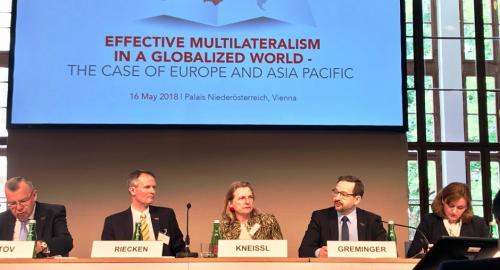Effective multilateralism for regional security challenges - Austrian Foreign Minister Karin Kneissl opens high-level conference on Europe and Asia Pacific in Vienna
Austrian Foreign Minister Karin Kneissl, on May 16, opened the high-level conference Effective Multilateralism in a Globalized World – The Case of Europe and Asia Pacific in Vienna. The conference takes place in the framework of the Austrian Chairmanship of the OSCE Asian Contact Group. It aims to reassess the main security challenges in both the European and Asia-Pacific regions together with representatives of OSCE participating States, international organizations – the United Nations, the OSCE, the International Atomic Energy Agency and the Comprehensive Nuclear-Test-Ban Treaty Organization in particular - but also civil society, academia and the media.

High-level conference on "Effective multilateralism for regional security challenges" - Vienna, 16 May 2018
In her opening address, Kneissl stressed the crucial role of effective multilateralism in the increasingly complex security environment, dominated by transnational challenges: “For Austria, effective multilateralism is the preferred method of addressing global challenges. During its upcoming Presidency of the Council of the European Union in the second half of this year, Austria will do its utmost to focus on making multilateralism relevant again.”
“In my view, we need more. More dialogue. More co-ordination. More co-operation. A retreat into unilateralism or isolationism will not solve any of the challenges our states face. It will not increase our safety or security. In fact, it will further erode the rules-based global order that has been the key to decades of increasing peace and prosperity,” the Foreign Minister added.
“Austria’s current role within the OSCE Asian Contact Group reflects the high geopolitical importance that my Ministry attaches to the Asia-Pacific region. We are well aware of the accelerating geopolitical changes and of the strengthening of this region on the world stage: it has become a necessity for us to look beyond our traditional foreign policy focus and to make this region a full-fledged priority – not only as an area of tremendous economic opportunities, but also of political and security relevance,” Karin Kneissl said.
OSCE Secretary General Thomas Greminger stressed that now more than ever, multilateral co-operation is needed in an increasingly inter-connected world. Greminger defined dialogue, connectivity and partnership as the main pillars of the OSCE Asian Partnership.
“In the OSCE’s experience, confidence-building measures and a shared normative framework have proven to be truly useful. If this experience can in any way be an inspiration to our Asian partners, the OSCE stands at their disposal”, said the Secretary General. “It is clear that we have a common interest to work together and to learn from each other. In that sense, the OSCE Asian Partnership provides a unique forum for a meaningful exchange of best practices on how to address complex threats and challenges that defy borders and, quite simply, to stay in touch.”
Secretary General Greminger pointed out that more can be done to advance structured co-operation with Asian regional organizations, including exploring possibilities for greater working-level co-operation. “Having partnerships is vital, but we also need to leverage them. Effective multilateralism means playing to our strengths,” concluded Greminger.
The conference takes place in a global security environment that is characterized by instability, complex transnational threats, regional conflicts and rapid technological change. The event addresses the urgent need for a better understanding of the underlying trends and factors of the erosion of the common security architecture. The discussions aim at renewing impetus for strengthening effective multilateral co-operation.
Thematic sessions will explore regional approaches to security and related threats to geopolitical and human security as well as promoting partnerships between international organizations, civil society and academia. Participants will also address the OSCE’s “second dimension” – economic and environmental security – by discussing how better economic connectivity could boost multilateral agreements and regional co-operation.
A side-event will be devoted to building cross-regional alliances to better combat the trafficking of human beings in Europe and the Asia-Pacific.
Source: Organization for Security and Co-operation in Europe
- 195 reads
Human Rights
Ringing FOWPAL’s Peace Bell for the World:Nobel Peace Prize Laureates’ Visions and Actions

Protecting the World’s Cultural Diversity for a Sustainable Future

The Peace Bell Resonates at the 27th Eurasian Economic Summit

Declaration of World Day of the Power of Hope Endorsed by People in 158 Nations

Puppet Show I International Friendship Day 2020

